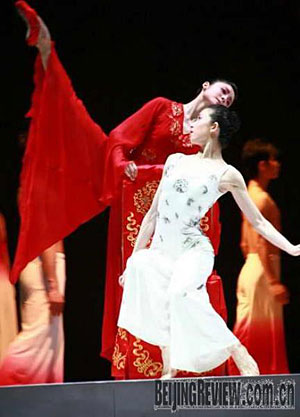|
 |
|
A scene from the ballet version of The Peony Pavilion (SINA.COM) |
The Peony Pavilion, a ballet version of the Chinese classic, was staged by the National Ballet of China (NBC) at Tianqiao Theater in Beijing, from May 2 to 7, 2008.
The play, written by Tang Xianzu (1550-1616), tells of a love story between Du Liniang and Liu Mengmei.
Du, the daughter of a high-ranking official, takes a walk in the garden where she falls asleep. She dreams of her lover Liu, whom she has never met, before being woken by falling petals. Unable to recover the enchantment of her dream, Du wastes away; and seals and buries her profile near the pavilion before she dies. Three years later, the profile is discovered by Liu, who prepares to attend the imperial exams. He falls in love with Du's ghost and helps her to resurrect herself. In the end, Liu tops the exams and they become a true couple.
The adapted ballet version, the first of its kind, can be seen as a sort of exploration.
The Peony Pavilion has been performed mostly through drama such as the Kunqu Opera, since its debut some 400 years ago. The creative team, the core of the performance, consists of top artists at home and abroad - Li Liuyi, a veteran director with Beijing People's Arts Theatre; composer Guo Wenjing; choreographer Fei Bo; German stage and light designer Michael Simon; Emi Wada of Japan, who is in charge of costumes; and the NBC.
"Tang Xianzu left us a dream," said director Li. "Over the past 400 years, so many people have tried to interpret it. Now we are trying to dance into the dream.
"We all enjoy working on the ballet because our creation is based on a very good story. It is such an extreme tale that it gives us many possibilities. We are trying to make this dreamy ballet extremely beautiful and true."
"I consider The Peony Pavilion an opportunity to experiment, so I hope to break through the old rigid form of Chinese ballet music," composer Guo noted.
His score blends the Kunqu Opera and Western classical music. Besides using his own compositions, Guo has refashioned the Kunqu Opera arrangements for Ravel's Daphnis and Chloe, Debussy's The Afternoon of a Faun, Respighi's Roman Festival, Holst's The Planets and Prokofiev's Scythian Suite.
"The director, composer, art and costume designers are all artists with strong personalities and each has his or her own understanding of the story," said Fei, the 28-year-old choreographer, recalling the process of creating. "In my interpretation, all the love, desire, suffering, departure and death happens between the time when Du closes her eyes and awakens. This is the first full-length ballet that I choreographed on my own. It is full of excitement, pain, suffering, confusion and exploration."
According to Zhao Ruheng, the president of NBC, the ballet was seven years in the making.
"It is such a great Chinese classic, and the playwright Tang is often compared to William Shakespeare of England," said Zhao. "What Tang and Shakespeare ultimately shared was their deep understanding of how passion plays out among mortals, especially the young, and how it can trump social mores and defy rigid tradition."
"Both authors relied on supernatural forces to further their plots, " she continued. "The Flower Goddess, for instance, who brings the dream lovers together in The Peony Pavilion, is almost interchangeable with Puck in A Midsummer Night's Dream or Ariel in The Tempest."
The Peony Pavilion is the NBC's second original ballet after Raise the Red Lantern, produced in collaboration with director Zhang Yimou in 2001. | 